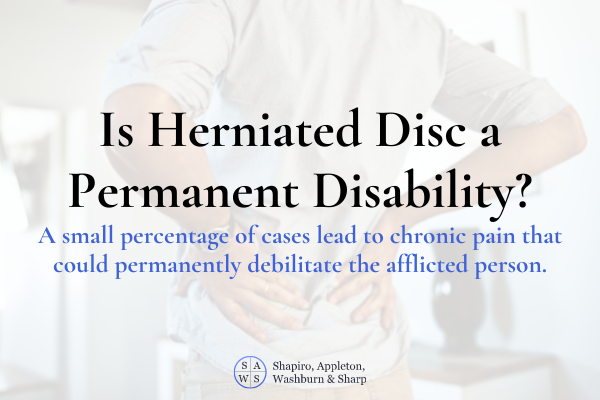Small discs work as cushions for the bones in our spine, providing them protection against shocks and injuries. Sometimes, a rupture in their outer layers can cause these discs to slip, or herniate. Herniated discs can be extremely painful, even causing disability in certain cases.
Herniated discs mostly affect individuals who sit for long hours, or whose daily routine involves activities where they need to bend or lift heavy items. People in their 30s or 40s are more susceptible to herniated discs.
A Herniated Disc and its Effects on Your Work
Herniated discs can lead to serious medical complications with long-term effects if left untreated. An affected individual is at risk for chronic pain, or even paralysis, without timely or proper treatment for their herniated disc.
The unbearable pain in a herniated disc can make even the simplest tasks seem overwhelming, or downright impossible to perform. In chronic cases, even sitting may be uncomfortable, making it difficult to find jobs where you can work, while suffering from a herniated disc.
Medication may be able to treat a mild case of herniated discs, which usually occur with the soft tissue slipping through the spinal casing. In many cases, physical therapy, or sometimes even surgery, is the only solution.
You must urgently seek all the available medical options to treat the herniated disc before it turns into a very serious health issue. For a blue-collar worker, a herniated disc may hamper the ability to fulfill regular duties that their job might entail.
LEARN MORE
Suffering a Cervical Spine Injury in a Virginia Accident
You may have to look into the option of applying for Social Security disability benefits if you are unable to work due to a herniated disc.
A Herniated Disc and Treatment Options
Before going for surgery as the last resort to repair your herniated disc, you should seek other treatment options, ranging from medications to physical therapies, to relieve the pain from your affliction. Some of the treatment options available for a herniated disc are:
- Ice and heat therapy to relieve the pain
- Non-steroidal anti-inflammatory drugs (NSAIDs) like ibuprofen, available over the counter
- Oral steroids, narcotic pain medications, and epidural injections, to reduce inflammation
- Physical therapy to relieve pressure on the herniated disc
- Decompression surgery, if medications or physical therapy fail to relieve the pain
If you are unable to work due to the severity of your herniated disc condition, despite having tried all the options discussed above, you may apply for Social Security disability benefits.
Social Security Disability Benefits
Victims are eligible for disability benefits if their disorder or condition is so severe that:
- It prevents the sufferer from working or accomplishing routine but necessary tasks without assistance. These everyday tasks may be cooking, bathing, dressing, or getting around.
- It lasts for at least a year or can potentially lead to the death of the affected individual.
Individuals who qualify according to these provisions are recognized as permanently disabled. They are then eligible for financial benefits based on their infirmity or disorder. The Blue Book, which you can look up on the official SSA website, has prerequisites of eligibility for all disorders.

Is Herniated Disc a Permanent Disability?
Spines are the workhorse of our bodies, keeping us upright, helping us bend, housing our nerves, and connecting all the important body parts to each other. A herniated disc is the result of the spinal nerves getting pressed out or crushed between the vertebrae.
Most individuals with a herniated disc, heal with rest and medication in 4 to 6 weeks. However, a small percentage of cases may worsen and lead to chronic pain that could permanently debilitate the afflicted person.
If your herniated disc has become a cause of your constant and chronic pain, and your symptoms are severe enough; you may qualify for monthly financial support with the Social Security disability benefits program.
Requirements to Qualify for Disability Benefits if You Have a Herniated Disc
The Social Security Administration (SSA) reviews disability applications, many of them for disability due to herniated discs. For your disability to qualify for the benefits program, the SSA needs to be completely convinced that your condition is making it impossible for you to work, or take care of yourself without assistance.
Some of the ways you can improve your chances to qualify for permanent disability benefits are:
- The impairment listing on the records provided by your doctor match impairments covered in the books of SSA
- The SSA determines that your age or education makes you ineligible for any jobs, despite your ability to work
- The SSA and medical professionals concur that your disability will not resolve for at least twelve months
How Do I Apply for Disability Benefits?
You will need to set up an appointment with the SSA and fill out an application. In your application, you need to provide specific details about the impact of your herniated disc on your work, your life, and your family’s life.
To qualify for disability benefits, you must substantiate evidence of your injury with a thorough spinal examination by a specialist. The medical investigations may include a physical, an MRI, and an SLR (straight leg raising) test.
Contact an Accomplished Virginia Beach Personal Injury Attorney Today
Research clearly shows that professional legal representation can improve your chances of getting approval from SSA-run programs that pay disability benefits. Experienced personal injury attorneys at Shapiro, Washburn & Sharp, can help you fill the application and collect medical evidence to further your claim.
Having a competent attorney is especially helpful where you need to file an appeal against the initial rejection of your disability benefits application. If you suffer from a herniated disc or any other debilitating medical complication and need help with your disability benefit application or appeal; call us today at (833) 997-1774 or contact us online to schedule an initial consultation to review your case.